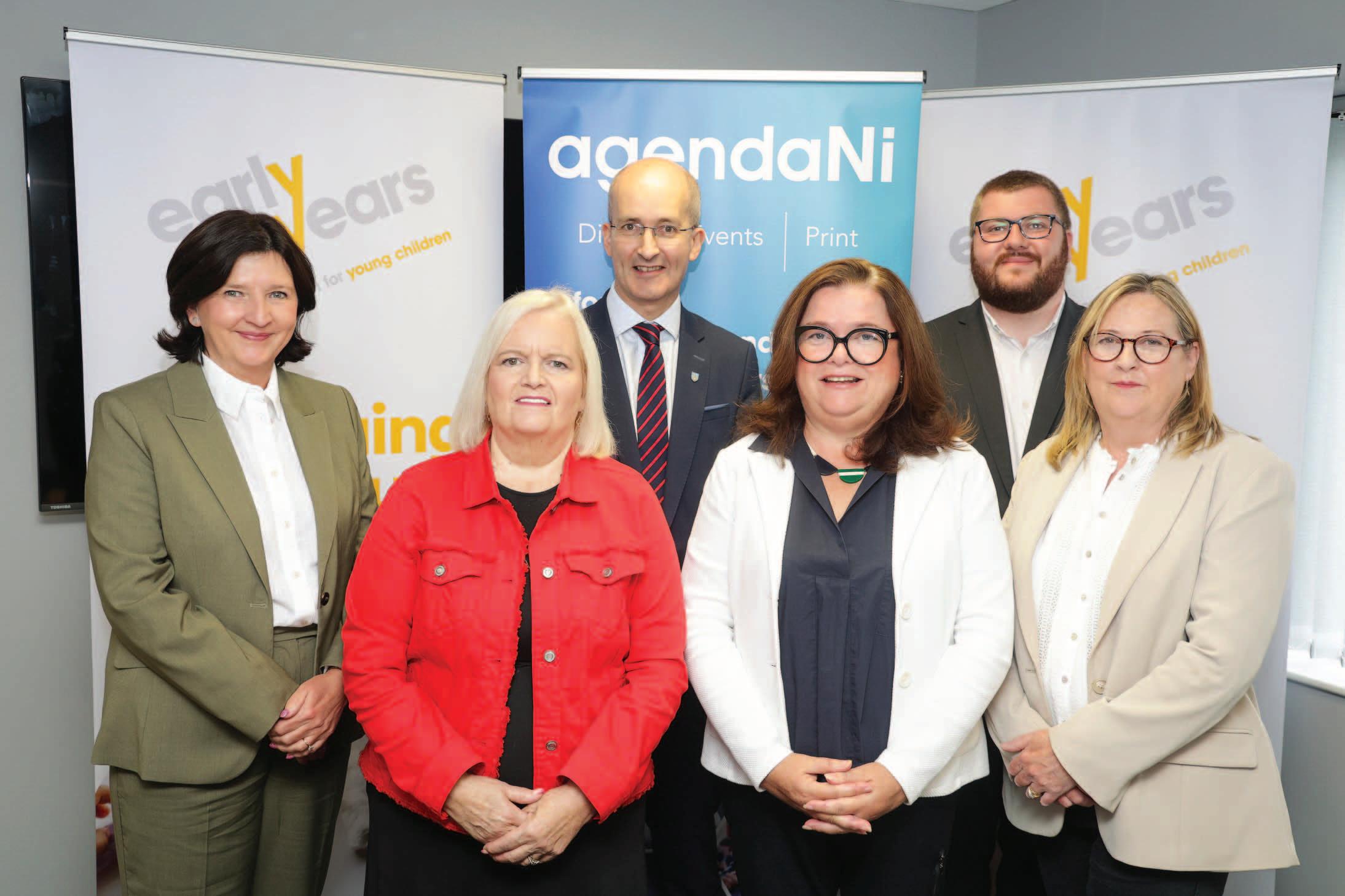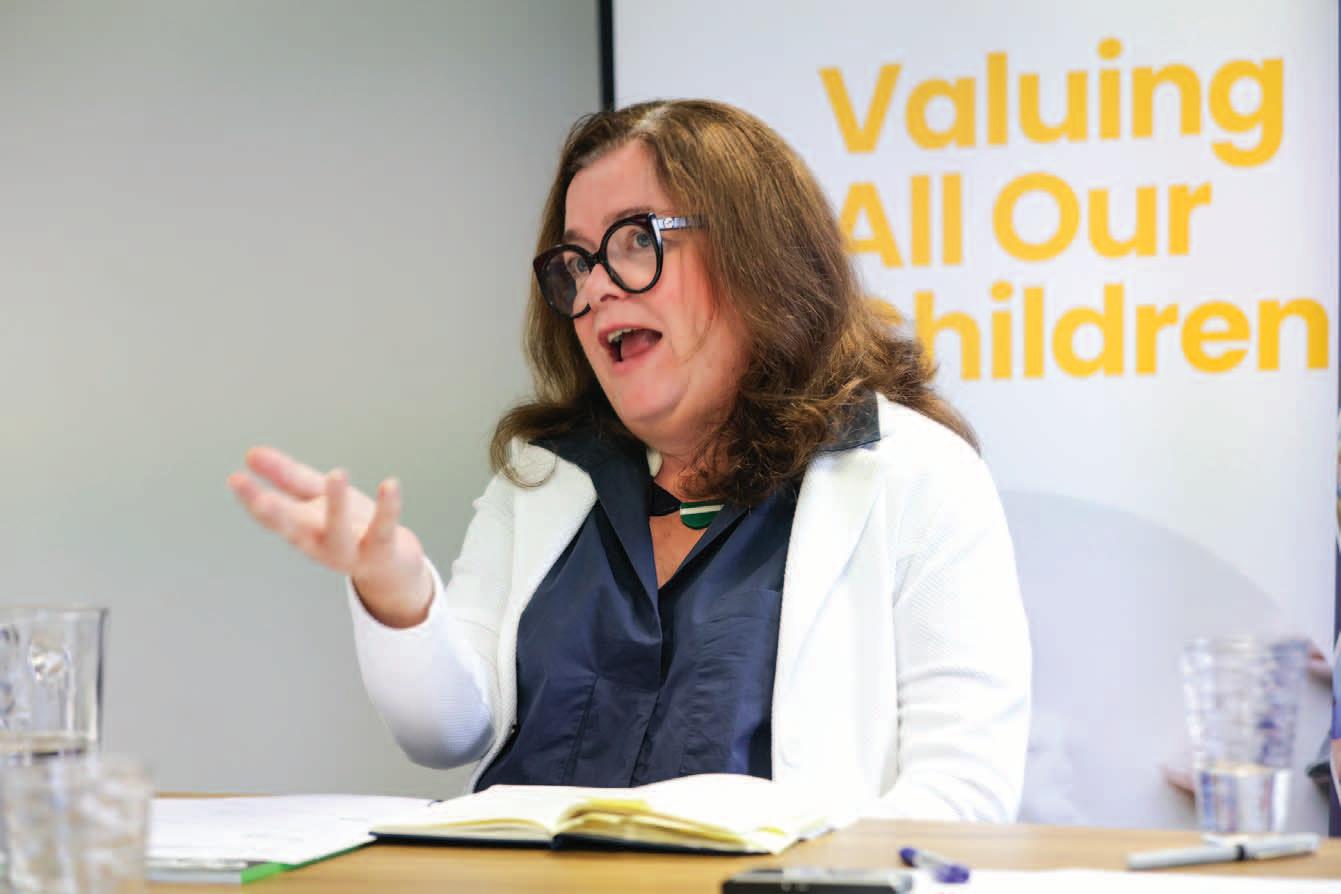Round table discussion hosted by
Delivering more affordable, accessible, high-quality early learning and childcare
Early Years hosted a round table discussion with key stakeholders on early learning and childcare.
What is the significance of early years education and care in reducing educational disadvantage and promoting more equitable outcomes for children?
Pauline Walmsley
The first three years of a child’s life are highly formative and offer a window to address educational disadvantage. It is
Round table discussion hosted by
only in very high-quality settings that we can deliver impact on outcomes for young children and deliver change. Whilst a lot of focus for investment in early years is on the impacts for disadvantaged children, the evidence shows that it is important that there are integrated and holistic early years services for all children, with additional support for children from disadvantaged backgrounds and with special needs. Early years should never be about disadvantaged children only.
Noel Purdy
I certainly agree with Pauline but early years education and care are critical in tackling educational disadvantage and promoting equity. As our Fair Start panel on educational underachievement found, international evidence, such as the Heckman Curve, demonstrates that early investment delivers the greatest longterm educational, social, and economic returns, particularly for children from disadvantaged backgrounds. That is why 13 of our 47 actions in A Fair Start focus on early years, including the standardisation of the pre-school day,
improved ratios, and SEN support. Investment at this stage is essential for levelling the playing field and securing better outcomes for all.
Patricia Lewsley-Mooney
Registered childminders play a unique role in childcare, offering mixed-age settings that foster empathy, sharing, and communication skills. Their work is vital during the first 1,001 days of a baby’s life, especially for infant mental health. Childminders often care for up to six children, including those with additional needs who may thrive better in homebased environments than larger daycare settings. Pilots such as curriculum childcare show promise, supporting disadvantaged families by combining child development with pathways into employment. Training initiatives, like communication support after the Covid19 pandemic, demonstrate ripple effects that extend beyond children to families, schools, and communities, strengthening equity and outcomes.
Paula Leathem
Early years experiences are crucial for all children, shaping their development and
Northern Ireland’s future workforce. Covid-19 significantly affected young children’s language development, socialisation, and confidence, highlighting the importance of early interactions and play. Building blocks such as first words, walking, and social engagement lay the foundation for lifelong learning. Equally important is supporting parents to return to work, as initiatives like Timely Careers help improve parental wellbeing, confidence, and mental health, which in turn positively impacts children. Early investment in both children and families strengthens development, equity, and longterm societal outcomes across Northern Ireland.
Roseann Kelly
Investment in early years care is not only a social good; it is an economic necessity. The Heckman curve demonstrates that the highest returns on public investment come from supporting children in their earliest years. Affordable, high-quality childcare enables mothers to return to fulfilling careers, strengthens their financial independence, and allows them to act as role models for their children. This independence is particularly vital in the context of gender inequality and violence against women and girls. For businesses, the evidence is equally compelling: companies that support gender diversity enjoy stronger staff retention, better problem solving, and higher profitability. Conversely, the lack of affordable childcare –especially during the summer months –weakens the labour market, limits women’s progression, and damages economic growth. No technological advance, including AI, will ever replace the human care and relationships young children need. That is why government must adopt a fundamental shift: recognising childcare as critical national infrastructure. We need every department to value childcare and the professionals who deliver it, in the same way that we value our teachers and health workers.
What are the main challenges facing the early years workforce, and what are the best solutions that could address these?
Patricia Lewsley-Mooney
The early years workforce faces significant challenges, particularly among childminders, whose numbers have halved over 15 years. Many are sole traders, working part-time or caring for their own children, facing high costs for insurance, equipment, and additional support for children with special needs.
Round table participants
Pauline Walmsley
Pauline Walmsley is Chief Executive of Early Years. She began her career with Early Years in the mid-1990s as Manager of the Cross Border Rural Childcare Project and later International Manager. She was appointed Chief Executive in 2019. Her early work in communities in Northern Ireland and Ireland shaped her commitment to working with parents and to growing a rich tapestry of services for young children including community, voluntary and independent pre-school, daycare, school age childcare and childminders. Walmsley has been closely involved with cross-border cooperation at a local level as well as global networking for peace and reconciliation.
Roseann Kelly
Roseann Kelly is CEO of Women in Business NI Ltd trading as The WiB Group. With a combined community of 250,000 engaged people, The WiB Group has a vision to help build an inclusive prosperous economy in Northern Ireland. Established in 2002, Women in Business is a notfor-profit registered charity with a voluntary board of 10 Trustees. The WIB Group consists of four business units Women in Business, Diversity Mark, Timely Careers, and The Centre of Learning. The WiB Group is committed to driving positive change through connections, accreditations, employment opportunities, and skills development.
Paula Leathem
Paula Leathem is Head of Human Resources at NIE Networks. She is a Chartered Fellow Member of CIPD who has worked in the Electricity Industry for 37 years, the past 13 of which have been in HR senior leadership roles. As Head of HR, Paula leads a team of HR and payroll professionals. Key strategic areas of focus include change management; talent management and organisational training and development; employee engagement and communication at all levels internally and externally; and diversity and inclusion. This highlights her personal and professional dedication to fostering a positive and productive work environment.
Patricia Lewsley-Mooney
Patricia Lewsley-Mooney is CEO of NICMA, the Childminding Association. Lewsley-Mooney served as the Commissioner for Children and Young People in Northern Ireland from January 2007-2015. As a former MLA and district Councillor, Lewsley-Mooney has a long track record of advocating for children, young people, and women across a range of policy issues. She promotes active citizenship through her leadership roles in various organisations including the Training for Women Network and Women into Politics. Lewsley-Mooney is currently a board member of NICVA, and Foyle Women’s Information Network (FWIN) and Chair of Training for Women Network (TWN) and Men’s Advisory Project (MAP).
Noel Purdy
Noel Purdy is Director of Research and Scholarship and Director of the Centre for Research in Educational Underachievement at Stranmillis University College, Belfast. A former Modern Languages teacher, he has worked in teacher education for 19 years. His main areas of research interest are in educational underachievement, special educational needs, and pastoral care, with a particular interest in addressing on- and offline bullying in schools. In 2020-21 he was invited to chair the Expert Panel on Educational Underachievement which led to the publication of the action plan A Fair Start.
“We have got a more complex group of children today in terms of special and additional educational needs, and our workforce needs to be supported in meeting those needs.” Noel Purdy
Retention is difficult, so training and accreditation are essential to keep expertise in the sector. Financial pressures and inflexible systems create barriers for both providers and parents. Solutions include funding support for equipment, flexible care models, affordable insurance, fair pay, and structured training pathways, ensuring sustainability, quality, and equitable access for children across all needs.
Roseann Kelly
Recruitment and retention are the most pressing challenges in the sector, driven by low pay and a lack of career progression. Childcare providers face spiralling costs – particularly staffing –but without adequate funding support, quality provision cannot be sustained. This is a sector in decline, with longstanding providers closing their doors because the work is no longer financially viable or attractive to the next generation. Government must treat this as an urgent economic and social issue. One practical solution would be to introduce a support model similar to that used for local pharmacies – where sustainability is underpinned by direct government funding, recognising childcare as a public good rather than a private burden.
Paula Leathem
From a career perspective, there is a lot of work that needs to be done to
promote the sector as a career choice. There are core skills that are needed in childminding. Those are core skills that many people already have. We need to liken it to someone who is considering becoming an educator or going into nursing or some sort of care. We need to give child minding that same sort of
professionalism and level of kudos and recognition.
Pauline Walmsley
Firstly, we do not have enough people interested in a career in early learning and care and how it is perceived by society as a career. We then have roughly about an 18 per cent turnover, and that is mainly due to burnout, low morale, and the opportunity to earn more elsewhere for less responsibility. But it is also due to a structural divide between the statutory and non-statutory sectors. There is the opportunity for very well-trained people in the non-statutory sector to access better paid employment in the statutory sector. So, there is an opportunity for government to help close that gap and cease creating a situation where they are competing with each other to the detriment of learning and development for birth to threes.
Noel Purdy
The Early Years workforce faces perceptions of being ‘low status’, as well as low pay, limited qualifications, and high turnover, despite the sector’s commitment and dedication. Rising numbers of children with additional needs increase the demand for training, assessment, and support. Addressing these challenges requires a high-quality, well-remunerated workforce. As part of A Fair Start, we recommended that the departments of Education and Health codesign a fully resourced Early Years
“We need to make sure there are career pathways, with some sort of competency-based training and development. This should be free and structured to allow for better terms and conditions of employment.” Paula Leathem
workforce strategy for training, qualifications, and continuing professional development, ensuring all Early Years staff are supported, skilled, and retained.
Pauline Walmsley
Early Years recently entered into a partnership with Stranmillis University College signalling our intention to form a professional association to address that issue. I hope that over the next five years, we will see some change. I would like to highlight that not only is the ability of parents to access work impacted, but with a staff turnover of one in 20, one in 20 children are regularly facing a new caregiver. They are probably facing a less experienced caregiver, and it brings us right back to development outcomes for children. Staff turnover has a really serious impact on those child development outcomes for children.
What challenges do childcare providers face in maintaining sustainability, particularly in light of funding structures, parental fees, and wider economic pressures?
Paula Leathem
Inadequate funding is the main issue and that is compounded by rising costs. For childcare facilities costs are increasing, such as insurance costs. Because those costs are rising, the fees are having to rise, and that therefore makes it more inaccessible for parents. That has a knock-on effect to employers, as they are not getting people into the jobs market. Problems in accessing childcare leads to staff shortages in other sectors. With a lot of economic uncertainty in the background a structured funding model is increasingly needed.
Pauline Walmsley
High-quality, safe childcare is increasingly unaffordable on parental fees alone, requiring additional support. Costs are driven by salaries, regulatory compliance, and the need to meet parent demand, yet providers cannot adapt as quickly as the market due to strict regulation. Sustainability depends on unit size, with small rural settings often requiring financial backing. Community and voluntary providers face governance
“For 60 years, Early Years has been campaigning, and we have finally seen a clear Programme for Government action around this, and it is to be welcomed.” Pauline Walmsley
and volunteer challenges, while private providers face business costs such as rates. Broader economic pressures, including reliance on grandparents and workforce shortages, further impact sustainability. Effective planning requires better data, workforce forecasting, and targeted financial support to maintain quality and accessibility.
Paula Leathem
Employers are seeing increasing demand for flexible working, particularly from female colleagues, and supporting this is essential to retain skilled staff. Many seek partial days rather than full days off, which creates scheduling challenges within teams. Limited availability and inflexibility in early years childcare exacerbate the issue, as parents struggle to match working patterns with childcare provision. Some staff reduce hours to care for grandchildren, further impacting workforce capacity. Addressing these challenges requires expanded, flexible, and accessible early years services, enabling parents to work as needed while maintaining continuity and productivity in the workplace.
Patricia Lewsley-Mooney
When I came into this job nearly nine years ago, what I realised was that child

minders were looked at as glorified babysitters. When in fact they are professional childcare providers and I hope that during my time with NICMA I lifted their profile. You do not need a qualification to be a child minder. And I do not ever want that to change, because the majority of our registered childminders are vocational; they just want to look after children. Some of the work that they do with children is amazing, because it is based on life skills and not on the academic side. They have that natural ability, rather than saying you have to have a level two or level three before you can go into childminding. That does not mean to say that we do not try to get them that accreditation or qualification, but some of them struggle because they are not academically minded. Some of the other issues and challenges for us as an organisation, is the length of time it has taken us to get people registered. It used to be three to six months, but now it is maybe six to nine months.
Noel Purdy
The status, the support and remuneration in the sector needs to reflect the significance of the sector. If government is really serious, as they appear to be in the Programme for Government, about 4
“Recruitment and retention are the most pressing challenges in the sector, driven by low pay and a lack of career progression.” Roseann Kelly
the new emphasis on Early Years, then there has got to be delivery of support and training for the sector. Rural disadvantage was also something that we heard a lot about in our Fair Start consultations. There is a big difference between provision in urban areas such as Greater Belfast compared to rural Fermanagh or West Tyrone. Rural areas are particularly vulnerable. If a childminder stops operating or a voluntary early years setting closes because of sustainability issues, that can have a disproportionately high impact on a rural community, much more so than in an urban area, where there is often other provision nearby. We therefore need to ensure that our policies are not too urban-centric or Belfast-centric, and that we realise that provision in rural areas is equally important.
Roseann Kelly
The single greatest challenge for providers is sustainability. Childminding units are closing at an alarming rate, and with each closure we lose not only a vital service but also skilled professionals. Without immediate intervention, the sector risks collapse. Government support is essential. Simple measures –such as rates relief for childminders, already explored by the Assembly’s allparty working group – could provide a rapid lifeline. Longer term, structured
funding must replace reliance on escalating parental fees. The cost of inaction is enormous. When women are forced into part-time roles because of unaffordable childcare, they lose out on promotion opportunities, long-term earnings, and pension security. Employers lose skilled staff. The wider economy loses productivity. Failing to invest in childcare means failing to invest in our current and future workforce, particularly women.
What are the opportunities that exist to strengthen the early years workforce so they can support both high quality provision for children and greater access to employment for parents?
Roseann
Kelly
We must find a sustainable model that works for children, parents, providers, and the economy. Options could include adopting a pharmacy-style model of state support, extending the education system’s responsibility from age one, or introducing universal free childcare. What matters is that childcare is recognised as
infrastructure and funded as such. Making childcare the responsibility of the Department of Education would create coherence and accountability. Alongside this, the current childcare tax credit and registration systems should be simplified to make access easier for families. We can learn from international best practice: in Canada, the Government provides $10-per-day childcare, treating it as a long-term economic investment. Northern Ireland should be equally ambitious in building a workforce and funding system that sees childcare as central to social and economic prosperity.
Paula Leathem
We need to do something much more innovative than what we have been doing. There is no doubt there is a need for childminders. As a mother of four, I chose childminding, and I had the most amazing childminders, which was fantastic. I also worked part time for a number of those years. These are much needed roles, and they are really important roles. Someone can make a fantastic career from it. But then how do we support that? We need to make sure there are career pathways, with some sort of competency-based training and development. This should be free and structured to allow for better terms and conditions of employment, and maybe some type of mentor role support as well.
Patricia Lewsley-Mooney
We have childminding academies across the 11 councils. We have had a good uptake, with 146 newly registered childminders in 2024/25. They get additional training in business and special education needs. They get a starter kit, which comprises of a stair gate, a fire blanket, first aid box etc. And they also receive NICMA membership, which includes public liability insurance, with the whole package worth about £800. That makes all the difference if you are on a low income or benefits if you think you might like to become a registered childminder. We have also approved home child carers, who work in the family’s home helping parents who have children with additional needs, work unsociable hours or who live in rural areas. The anecdotal evidence tells us that if you cannot get your childcare in the rural setting where you live, you may take them to the nearest town. And there is every likelihood that when you have taken them there for childcare you will take them there for school. Therefore, rural schools are losing out.
Noel Purdy
There are opportunities to strengthen the Early Years workforce. Let us celebrate first of all what we do have in terms of the higher-quality courses at Stranmillis and in all of our regional FE Colleges who also do fantastic work. But there has got to be greater encouragement and incentivisation for the Early Years workforce to upskill and to engage in further study. Many of them already do so, and it is a huge credit to them, but there is always room for more investment in training and support. We have got a more complex group of children today in terms of special and additional educational needs, and our workforce needs to be supported in meeting those needs.
Pauline Walmsley
The voluntary community and independent sector have held the space for the last 60 years, and they have demonstrated that they are very prepared to undertake new learning. We are seeing an increasing diversity in families and in children within settings. We need to ensure people have support with these additional needs. There are two aspects in particular that are very important. A practicum based learning for this sector works particularly well. Apprenticeships and more practicum placements for degree programmes along with mentoring and support for people is critical in the sector.
What single policy lever could help deliver a more affordable and sustainable childcare system that meets the needs of children, families, providers, and the wider economy?
Noel Purdy
It is quite simple. For the first time ever we have a commitment from the Executive parties as one of the nine key priorities of the Programme for Government to deliver more affordable, accessible, high quality early learning and childcare. This includes developing and producing the early learning and childcare strategy, providing enhanced funding for existing early years and childcare schemes to better support children facing disadvantage and those with additional needs. So, all the key
elements are there; we just need to see delivery of this with a costed implementation plan and a clear timescale to turn words on a page into action in our communities.
Paula Leathem
I think that the strategy and its implementation are key, as is the funding model for the sector. The idea of a similar model to doctors and pharmacies is really interesting, with perhaps a cap on the payments made by parents and government making up the rest. A policy supporting the sector funding model is key.
Roseann Kelly
The evidence is overwhelming; what is missing is long-term action. We need a fully funded, 20-year plan; not another short-term, four-year cycle. Funding must be stable, ambitious, and predictable if we are to build a sustainable system. Just as important is cultural change; caring for children must be recognised as critical to our economy. Carers must be valued and rewarded on par with teachers, because they are laying the foundations of our future workforce and society. Without that recognition, we will continue to lose skilled staff and weaken our economy.
Patricia Lewsley-Mooney
We have it in the Programme for Government, but we have to see that
rippled out into action. We still have not got the childcare strategy, and if we get the strategy, it needs to be funded, and it needs to have an implementation and action plan with it, so that we all know what our role is and how we can contribute to it and make that difference, particularly for children.
Pauline Walmsley
For 60 years, Early Years has been campaigning, and we have finally seen a clear Programme for Government action around this, and it is to be welcomed. The aspiration within it is good, but we now need serious investment. There are things happening such as Fair Start, Learning to Learn, the curriculum review, and the other reforms that are happening within education. The Northern Ireland Childcare Subsidy Scheme is entering its second year, and we have to be able to learn lessons from that and look at how that can be expanded in the future, to provide more support to parents with childcare costs. Child development and enabling the workforce to best meet the needs of children are the two critical aspects of achieving the outcomes we need.
Patricia Lewsley-Mooney
Although we have the subsidy, we also need to look at business support measures. There has been a report done but not firm proposals yet.
“Community and voluntary providers face governance and volunteer challenges, while private providers face business costs such as rates.” Patricia Lewsley-Mooney

















